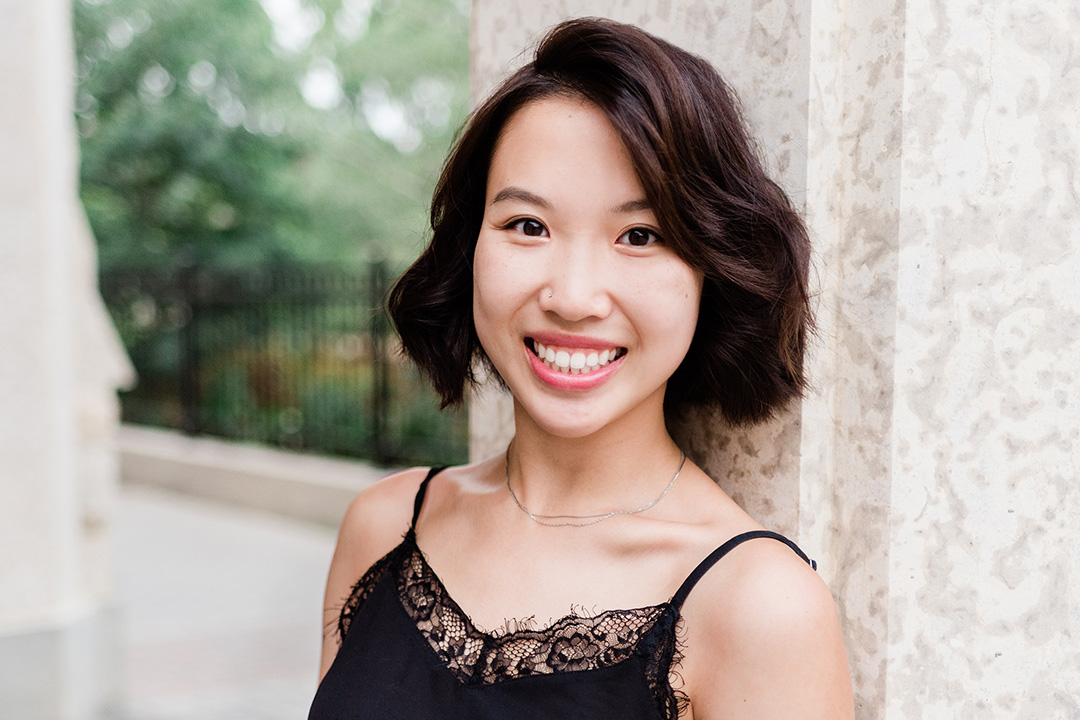
USask undergraduate researcher investigates the impact of COVID-19 on people living with HIV
The management of COVID-19 in those living with HIV may be different from others—and a USask researcher hopes to help determine the best treatment path.
By Brooke KleiboerUniversity of Saskatchewan (USask) College of Kinesiology undergraduate student Topaza Yu has joined forces with a University of Toronto research team to understand the effects of COVID-19 infection in those living with human immunodeficiency virus (HIV).
“COVID-19 alone is already a complex, severe infectious disorder,” said Yu. “Understanding the co-infection of COVID-19 and HIV adds to the complex equation.”
Yu was awarded a position in the Amgen Scholars Canada program in summer 2021—allowing her to pursue an advanced research experience under the supervision of mentor Dr. Reina Bendayan (PharmD) at the University of Toronto Leslie Dan Faculty of Pharmacy.
The team investigated what happens when those living with HIV become infected with COVID-19.
“Specifically, we wanted to investigate how the management strategies for COVID-19 patients co-infected with HIV are different from non-co-infected patients and how the treatment outcomes may differ,” said Yu.
It is estimated that 60,000 Canadians are living with HIV. HIV is a virus that attacks the body’s immune system. Left untreated, the immune system can become weakened, and those who are immunocompromised may be at a higher risk of negative outcomes from COVID-19 infection.
HIV—although a chronic condition—can be effectively managed through a medication regimen that often consists of antiretroviral (ARV) treatments, which works to decrease the viral load of the patient and slow its progressive attacks on the immune system.
“Epidemiological data have shown that people with lower socioeconomic status face more barriers to accessing not only the COVID-19 vaccine but timely ARV treatments due to the pandemic,” said Yu.
“This highlights the importance of creating accessible global health care and health-related services.”
Through a comprehensive literature review, the study found the effectiveness of COVID-19 vaccines in those receiving ARV treatments is similar to those without HIV.
“There is no evidence to support a lower immune response to COVID-19 vaccines for people living with HIV and receiving antiretroviral treatment or people living with no HIV,” said Yu.
This is good news for those living with HIV–the COVID-19 vaccine will serve to protect them to the same degree as non-HIV individuals.
Those living with HIV who are undergoing ARV treatments may benefit from their protective effects in the management of their response to the COVID-19 virus.
Those who are not receiving ARV treatments or who have other health challenges may experience a more severe response to COVID-19 infection. Clinical and pharmacological management strategies need to be adapted to the unique treatment situations of each patient.
This is among the first research to examine the appropriate strategies to manage the effects of co-infection of COVID-19 and HIV.
“We hope that our findings can help others better understand the pharmacological management of COVID-19 and HIV co-infection and help co-infected patients achieve optimal therapy and a higher quality of life,” said Yu.
The work is still ongoing and is led by Mr. Chukwunonso Nwabufo, a University of Toronto doctoral student supervised by Bendayan and who served as a day-to-day mentor for Yu during the summer of 2021.
The team plans to draft a manuscript for submission to an academic journal in the near future.
“I have always enjoyed and loved the way research fed into my sense of curiosity and innovation. The unanswered questions and work that still needs to be done keeps driving me forward.”
The research was supported by the Amgen Foundation through the Amgen Scholars Canada program. Amgen Scholars is an international program funded by the Amgen Foundation with technical and directional assistance provided by Harvard University.
To find out more about Bendayan and Yu’s work, visit the following websites:
https://www.pharmacy.utoronto.ca/faculty/reina-bendayan-professor
This article first ran as part of the 2021 Young Innovators series, an initiative of the USask Research Profile and Impact office in partnership with the Saskatoon StarPhoenix.
Brooke Kleiboer is a communications student intern in the USask Research Profile and Impact unit.
